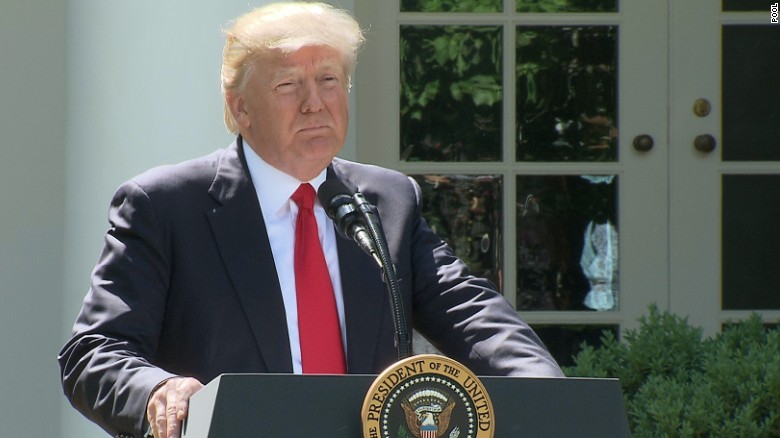
By Atayi Babs
The United States of America today found itself in unfamiliar company as it joined Nicaragua and Syria in walking away from the Paris Agreement.
In an announcement on Thursday, President Donald Trump declared that he is withdrawing the United States from the landmark Paris climate agreement in keeping with his campaign promises.
He said moves to negotiate a new “fair” deal that would not disadvantage US businesses and workers would begin.
Mr Trump said during last year’s presidential election campaign that he would take the step to help his country’s oil and coal industries.
Opponents say withdrawing from the accord is an abdication of US leadership on a key global challenge. The Paris agreement commits the US and 187 other countries to keeping global temperatures rises “well below” 2C (3.6F) and “endeavour to limit” them even more, to 1.5C.
Trump’s decision alarmed leaders around the world, drawing swift and sharp condemnation from foreign officials as well as top U.S. environmentalists and corporate titans, who decried the U.S. exit from the Paris accord as an irresponsible abdication of American leadership.
But Trump cast his decision as a “reassertion of America’s sovereignty,” arguing that the climate pact as negotiated under President Obama was grossly unfair to the U.S. workers he had vowed to protect with his populist “America First” campaign platform.
“I was elected to represent the citizens of Pittsburgh, not Paris,” Trump proclaimed in a forceful and lengthy speech from the Rose Garden of the White House.
The United States now joins only two countries — Nicaragua and Syria — in opposing a climate agreement reached by all other nations in 2015. A signature diplomatic achievement for President Obama, the Paris accord was celebrated at the time as a universal response to the global warming crisis.
In a statement issued Thursday, Obama said he is confident states and cities will continue pursuing a low-carbon future “even in the absence of American leadership.”
“The nations that remain in the Paris Agreement will be the nations that reap the benefits in jobs and industries created. I believe the United States of America should be at the front of the pack,” Obama said in a statement. “But even in the absence of American leadership; even as this Administration joins a small handful of nations that reject the future; I’m confident that our states, cities, and businesses will step up and do even more to lead the way, and help protect for future generations the one planet we’ve got.”
The Paris Agreement
The United Nations Framework Convention on Climate Change (UNFCCC) was adopted in 1992 and entered into force in 1994. It consists of 197 Parties (196 States and 1 regional economic integration organization). Among them are the United States, Syria and Nicaragua.
The UNFCCC’s ultimate goal is “preventing ‘dangerous’ human interference with the climate system,” that includes greenhouse gas concentrations, according to the UNFCCC’s website.
Parties to the UNFCCC during a December 2015 session in Paris adopted the Paris Agreement, seeking “to strengthen the global response to the threat of climate change.” One of the objectives is to hold the increase in global average temperature well below 2 degrees Celsius above pre-industrial levels.
A total of 175 parties signed the agreement on April 22, 2016, according to information from the UN. The agreement remained opened for signatures from April 22, 2016, to April 21, 2017. The latest nation to sign was Uzbekistan, on April 19.
The Paris Agreement came into effect in November 2016 after 55 countries accounting for at least 55 percent of total global greenhouse gas emissions formally ratified the agreement. So far, 147 parties have ratified the agreement.
Wasserman Schultz office referred us to several news reports indicating that if the United States abandons the Paris agreement, it would join Syria and Nicaragua as nonparticipants.
Reuters in December 2015 reported that Nicaragua objected to the climate agreement “saying it did not do enough to protect ‘Mother Earth,’ in a symbolic protest after the deal had been formally adopted.”
The news agency noted that Paul Oquist, head of the Nicaraguan delegation at the December 2015 session, said wealthy nations should do more to reduce their emissions. Nicaragua also had said developed nations were “not doing enough to reduce their use of carbon and are not providing sufficient funding to help the developed world adapt to the impact of climate change,” Reuters reported.










